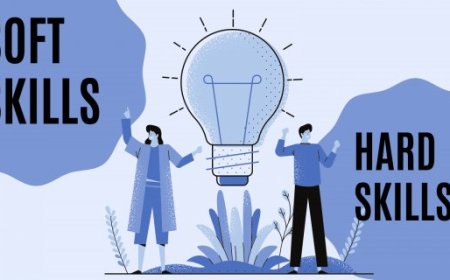Soft skills, also known as people skills or emotional intelligence, refer to the capacity to interact positively with others. These are personal qualities that influence how we connect with people, communicate, and engage in social situations.
The significance of soft skills in business success is immense. Although they might be trickier to develop compared to concrete skills like web design or accounting, they play a crucial role in running a prosperous business. Recognizing what these skills entail can assist you in identifying your strengths or areas for improvement in the future.
There is a famous saying which defines the significance of soft skills,
Work hard on your hard skills
Work even harder on your soft skills
- Mario Maruffi
Soft skills are becoming more and more important in almost every field. The capacity to effectively deal with complex relationships, communicate efficiently, and understand with clients has become essential in the age of distant collaborations and diverse teams.
Key Soft Skills and Their Significance
A. Communication Skills
-
Verbal Communication
Effective verbal communication involves expressing thoughts and ideas clearly using words. Whatever the field is, this skill helps to convey messages persuasively, ensuring that your audience understands your marketing strategies and objectives.
-
Non-verbal Communication
Non-verbal cues like body language and facial expressions play a role in communication. In this digital environment, being aware of these cues is crucial, especially in virtual meetings and presentations, where visual communication is prominent.
-
Listening Skills
Listening goes beyond hearing words; it involves understanding and responding appropriately. In any organization attentive listening plays an important role in comprehending client needs, customer feedback, and industry trends, leading to more informed decision-making.
B. Emotional Intelligence
-
Self-awareness
Being self-aware means understanding your emotions and their impact. In every field, self-awareness helps professionals manage stress, make informed decisions, and tailor their communication style to different situations.
-
Self-regulation
Self-regulation involves controlling and managing one's emotions.In every field, this skill is essential for maintaining composure, especially during high-pressure situations like tight deadlines or unexpected challenges.
-
Empathy
Empathy is the ability to understand and share the feelings of others. Empathizing with colleagues, clients, or any stakeholders helps create a more collaborative and supportive environment, building stronger connections and trust.
C. Teamwork and Collaboration
-
Building Positive Relationships
In teams across various fields, stimulating positive relationships is key. This involves effective communication, mutual support, and a collaborative spirit to achieve common goals.
-
Conflict Resolution
Conflicts can arise in any team, regardless of the field. Knowing how to address and resolve conflicts constructively is crucial for maintaining a harmonious working environment in projects across different industries.
-
Adaptability
Business atmospheres are ever-changing in every field. Being adaptable means adjusting strategies to meet new trends, regulations, and consumer behaviors, ensuring continued success in vital and evolving professional spaces.
D. Critical Thinking and Problem Solving
-
Analytical Skill
Analytical skills involve interpreting data and making informed decisions. In any field, this means analyzing relevant information, performance metrics, and market trends to optimize strategies effectively.
-
Decision Making
Effective decision-making is crucial in every professional context, where choices impact project success. This skill involves weighing options, considering data, and choosing the most effective course of action based on the specific requirements of the field.
-
Creativity
Creativity is vital for developing innovative and engaging content across various industries. Whether designing visuals, writing compelling copy, or brainstorming ideas, creative thinking sets professionals apart in their respective fields.
Assessing Your Soft Skills
Self-Reflection
Self-reflection is the process of looking inward and examining your own thoughts, feelings, and actions. In assessing your soft skills, take time to consider experiences and interactions. Ask yourself questions like
-
How do I handle challenges in communication?
-
Am I aware of my emotional reactions in work situations?
-
What steps do I take to collaborate effectively with my team?
This introspection helps identify areas of strength and areas that may need improvement, contributing to your overall personal and professional growth.
Seeking Feedback
Feedback from others provides clearer vision to your soft skills. In the context of organization, seek input from colleagues, team members, or supervisors. Ask for specific feedback on
-
Your communication style in virtual meetings or written communications.
-
How well you handle pressure or navigate challenges.
-
Your collaboration and teamwork dynamics within the projects
Constructive feedback helps you understand how others perceive your soft skills, allowing you to make targeted improvements.
Skill Assessment Tools
Utilizing skill assessment tools tailored for soft skill can offer a more structured evaluation. These tools may include
-
Online quizzes or assessments that gauge your communication style.
-
Emotional intelligence assessments measuring self-awareness, self-regulation, and empathy.
-
Teamwork and collaboration surveys to evaluate your contribution to group projects.
Engaging with these tools provides a quantitative perspective on your soft skills, complementing the qualitative insights gained through self-reflection and feedback. Remember, the goal is not perfection but continuous improvement in your skill set.
Developing and Enhancing Soft Skills
Communication Skills Development
Public Speaking Courses
Engaging in public speaking courses helps improve your ability to express ideas clearly and confidently.This skill is valuable for presenting campaigns, strategies, and engaging with clients or team members.
Writing Workshops
Participating in writing workshops sharpens your written communication skills. Whether creating compelling ad copy, emails, or social media content, honing your writing abilities is crucial for effective communication.
Networking Opportunities
Actively seeking networking opportunities allows you to practice and enhance your communication skills. Building connections within the community opens doors for collaboration, idea-sharing, and staying updated on industry trends.
Emotional Intelligence Training
Emotional Intelligence Workshops
Enrolling in workshops focused on emotional intelligence provides practical strategies for understanding and managing emotions. This is essential for maintaining composure during tight deadlines and induce positive working relationships.
Mindfulness and Stress Management
Mindfulness involves being fully present and engaged in the current moment, without judgment. It encompasses awareness of thoughts, feelings, bodily sensations, and the surrounding environment. Learning mindfulness techniques and stress management helps in cultivating emotional resilience.These skills are vital for maintaining focus and managing pressure effectively.
Stress management involves adopting strategies to cope with and alleviate stress. Regardless of the field, effective stress management is crucial for maintaining well-being and optimal performance
Developing Empathy Exercises
Engaging in exercises that develop empathy, such as role-playing scenarios or team-building activities, enhances your ability to understand and connect with the diverse perspectives of clients and target audiences.
Teamwork and Collaboration Exercises
Team-building Activities
Participating in team-building activities fosters a sense of unity and collaboration.In an organization where teamwork is essential, these activities strengthen interpersonal relationships and improve collective problem-solving.
Group Projects
Actively participating in group projects provides hands-on experience in collaboration.Events like campaigns often involve cross-functional teams, and effective teamwork ensures seamless execution of strategies.
Cross-functional Training
Engaging in cross-functional training exposes you to different aspects. This broadens your skill set, making you more adaptable and collaborative within diverse teams. It is valuable not only for individual professional development but also for building a more resilient and adaptable organization. It encourages a culture of continuous learning and collaboration, contributing to the long-term success of the business.
Critical Thinking and Problem-Solving Workshops
Case Studies
Analyzing case studies sharpens your critical thinking skills by examining real-world scenarios. In most of the field, this skill is crucial for evaluating project performance and making data-driven decisions.
Brainstorming Sessions
Brainstorming sessions are collaborative and creative group activities designed to generate a wide variety of ideas, solutions, or concepts within a specific context or problem-solving scenario. These sessions typically involve a diverse group of participants who contribute their thoughts, suggestions, and perspectives to encourage innovative thinking and explore different possibilities
Simulation Exercises
Engaging in simulation exercises allows you to practice problem-solving in a controlled environment. This is particularly beneficial in digital marketing for preparing for potential challenges and refining your decision-making skills.
Integrating Soft Skills into Your Professional Life
Incorporating soft skills into your professional life is vital for success . Start by applying effective communication in your daily interactions, ensuring clarity in conveying ideas. Taking up emotional intelligence by understanding and managing your own emotions,promotes a positive work environment. Actively collaborate with team members, building relationships and resolving conflicts constructively.
Adaptability is the key, so stay flexible in response to changing trends. Utilize critical thinking to make informed decisions, analyzing data to optimize marketing strategies. By weaving these soft skills into your professional fabric, you'll enter into the digital environment with finesse, enhancing both personal and team success.
Overcoming the difficulties in Developing Soft Skills
-
Common Obstacles: Developing soft skills can face hurdles such as time constraints, lack of resources, and resistance to change. The evolving nature of the industry may also pose challenges in dedicating sufficient time to skill enhancement.
-
Strategies for Overcoming Challenges: To overcome these obstacles, prioritize soft skills development by allocating dedicated time for training. Seek resources like online courses and workshops, and encourage a supportive workplace culture that values ongoing skill enhancement. Address resistance by emphasizing the positive impact soft skills have on professional growth and team success.
-
Continuous Improvement and Adaptation: Soft skills are dynamic, requiring continuous improvement and adaptation. Stay informed about industry trends and updates, integrating newfound knowledge into your skill set. Take up feedback, both positive and constructive, as a catalyst for improvement. Cultivate a mindset of lifelong learning, understanding that evolving soft skills contribute significantly to sustained success
Success is not solely defined by technical prowess but also by being proficient in soft skills. By consistently shaping your communication, emotional intelligence, teamwork, and critical thinking, you pave the way for a prosperous professional future. These skills are the cornerstone of effective collaboration, innovation, and resilience in the face of industry challenges. As you acknowledge and cultivate these soft skills, you not only Up lift your career but contribute to the business culture.
Related Posts
Understand Benefits of Soft Skills Better
Don't let a lack of soft skills hold you back. Learn to communicate, adapt, and ...
The Importance of Soft Skills
Learn why soft skills are crucial for professional success and how they foster e...
The Crucial Role of Soft Skills for Working Professionals
Explore the pivotal role of soft skills in the professional realm. Understand wh...
The Impact of Soft Skills on Digital Marketing Strategies
Explore the crucial role of soft skills in shaping effective digital marketing s...
Understand The Difference Between Soft Skills Vs. Hard ...
Explore the distinction between soft skills and hard skills, crucial in personal...
what are soft skills A Comprehensive Guide
Explore the essential non-technical abilities, known as soft skills, crucial for...
Exploring Types of Soft Skills and Their Impact
Learn various soft skills and understand their impact on personal and profession...
The Importance of Soft Skills in the Modern Workplace
Explore the vital role of soft skills in today's workplace, understanding how in...






























































